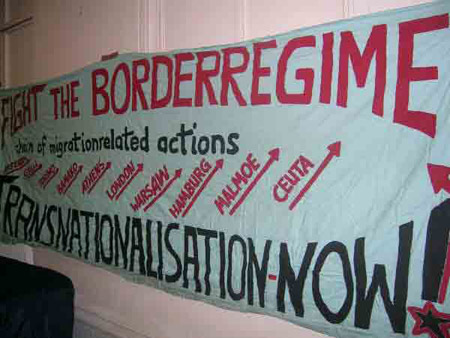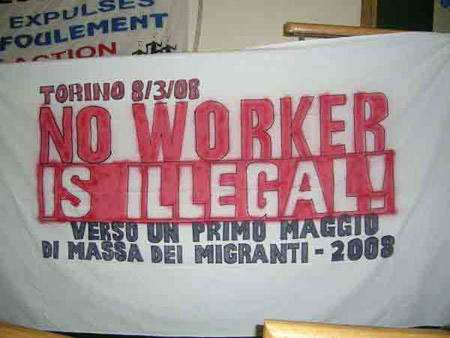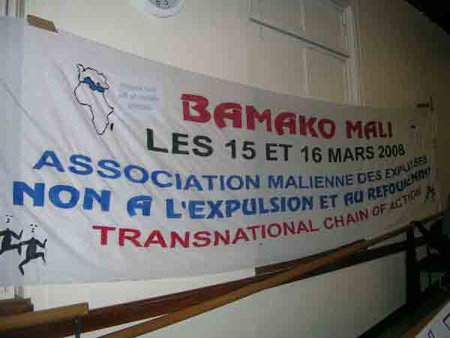Report from the London Conference against Immigration Controls
A Report from the Conference of Community And Trade Union Groups Against Immigration Controls, London March 29th
20.Apr.08 - Over 200 people attended the Trade Union and community Groups Conference Against Immigration Controls in London on 29th of March. The conference was hosted by the Finsbury Park local branch of the National Union of Rail, Maritime and Transport Workers (RMT). Many of the people attending were there as delegates of local trade union branches, migrant community groups or political organisations.
The conference was introduced by Glenroy Watson (Branch Secretary of the Finsbury Park RMT). Five panel speakers then made keynote speeches. Gemma, an asylum seeker working with the All African Women's Group at the Cross Roads Women's Centre spoke about the precarious experience of women migrants and asylum seekers. Although officially prohibited from working in the UK, many women asylum seekers are forced into irregular work to support themselves. They find themselves with no rights to demand better wages and conditions. Employers exploit this situation to undermine the wages of other workers. Gemma emphasised the unrecognised contribution of women in raising their children, the next generation of workers and said that women in her position needed the support from their fellow workers in struggle, on the basis of self-help and mutual accountability.
The next speaker was Alphonsus Okafor-Mefor, a Nigerian community activist, recently grant refugee status in the UK following a campaign largely supported by co-ordination of local Trade Union branches. Alphonsus talked of the abject conditions of asylum seekers in the UK and impact this has an individual's sense of self worth. He spoke of the importance of solidarity from Trade Unionists in his case and called on the Trade Unions to open their branch membership to Asylum Seekers, even though they are officially prohibited to work.
John McDonnell (left Labour Party Member of Parliament, in whose area are two of the largest detention centres in Britain, Hamondsworth and Colnbrook) spoke next. He talked of how the institutional left marginalised and excluded the voices of groups campaigning for migrants and asylum seekers and the unacknowledged populations of migrants and asylum seekers living in his area. He denounced the increasing co-ordination between British and European migration control policies, giving the example of the recent summit between the British and French premiers and their plans for joint deportation flights. He emphasised that the tightening of migration controls were an expression of the capitalist drive to maximise workers exploitation. He called on the conference to support those groups calling for an amnesty for migrants, but also to go further and argue for a world with no borders. He called for freedom of movement for all and for solidarity from the workers movement to achieve this aim.
Then 'Robinson' an undocumented Ecuadorian worker and activist with the Transport & General Workers Union Justice for Cleaners Campaign spoke. Robinson (not his real name) left Ecuador in 1999, where he had been an academic. Today he is a cleaner in the University where the conference was taking place. Robinson talked of the role of neo-liberal, capitalist globalisation in undermining the economic and social conditions workers of the global south and how mass migration is a response to these conditions. He spoke of the struggle in the UK for better pay and conditions and for political rights. He emphasised the ongoing role of transnational migrant communities in the global north in supporting the struggle of progressive movements in their counties of origin.
A speaker from London NoBorders then spoke about the transnational chain of migrant related events, explaining each stage in the chain from Amsterdam, Sevilla, Torino, Bamako, London, Athens, Warsaw, Hamburg, Malmoe, and Ceuta and illustrating my talk with the banners that hug around the hall. He emphasised the importance of building transnational solidarity in the face of increasing co-ordination of global capitalism and immigration controls, and called for solidarity and with the protests against Frontex in Warsaw and support for the migration-related axis in Malmoe.
There was then an open microphone with many passionate contributions and proposals from the conference floor. This was followed by workshops on Anti-Deportation Campaigns, Low Pay and Conditions, Resisting immigration Controls in the Workplace, Access to Public Services, Domestic Work, sex Work, Regularisation. Food was provided by the London Food Not Bombs Collective.
There was then a final plenary, where these workshops reported back and their proposals were endorsed. These included supporting the demonstration by the Chinese community against Immigration Raids on the 21 April. Campaigning for unions to allow asylum seeker to join and expand their support of workplace migrant struggles and anti-deportation campaigns. To pressure the public services unions into supporting workers who refuse to carry out immigration checks before providing services. To convene regular meeting to advance and develop the aims of the conference.
All in all it was felt to be good days work and look forward to forward developing this project in Trade union and community group co-ordination.

the main action chain banner during the conference in London

the banner from Torino in London

the Banner from Bamako in London

